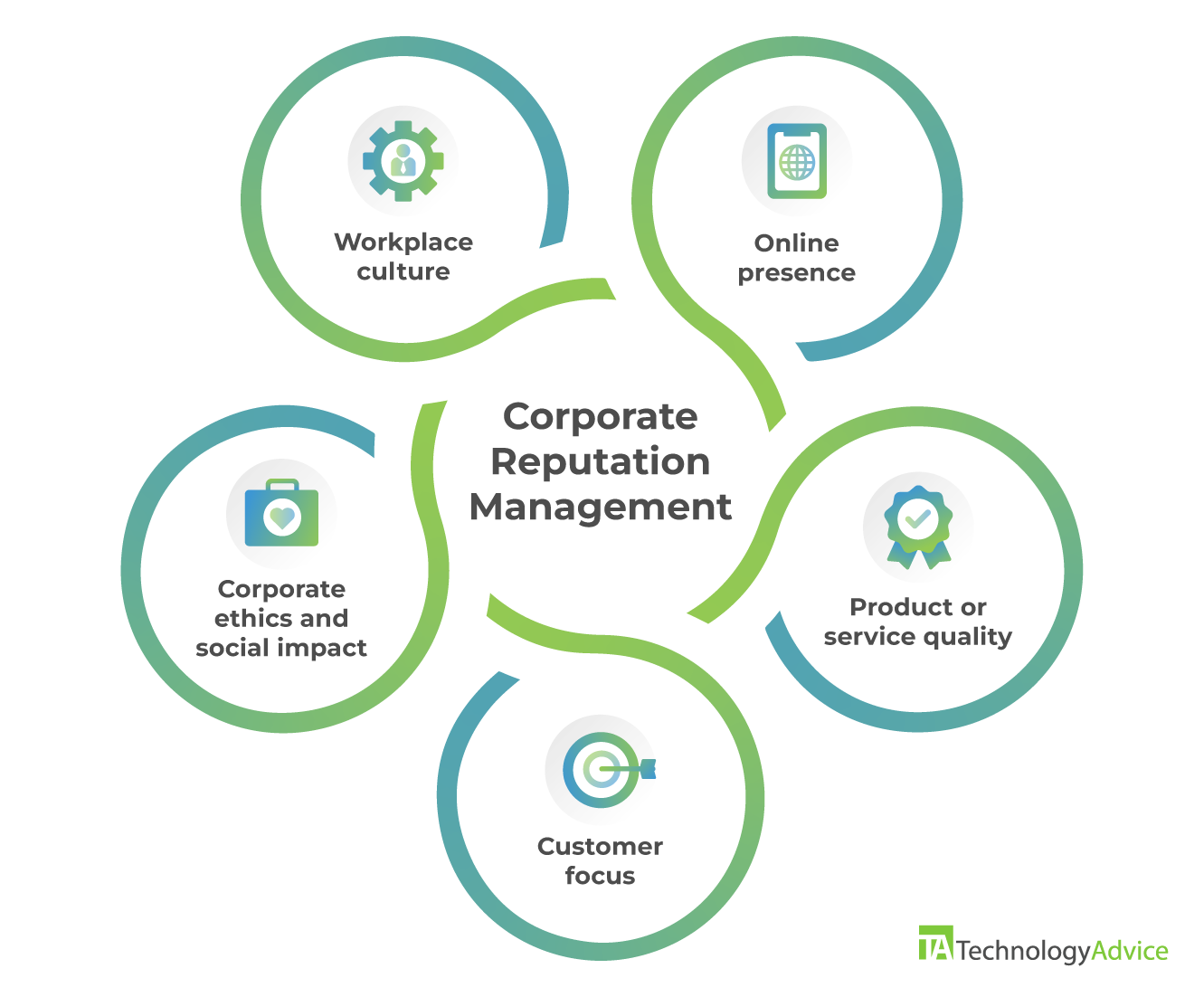Key takeaways
What is corporate reputation management?
Corporate reputation is the public perception of your company and its brand. Put simply, it’s how people feel about your business. A company’s reputation is built on a variety of factors; it does include product or service quality, of course, but it’s also informed by workplace culture, customer experience, social impact, and online presence, among other factors.
People’s ideas about an organization are built on what they observe. Corporate reputation management is the work you put in to influence that perception and make sure that it is overall positive.
Reputation management is an ongoing process that takes internal, external, reactive, and proactive work. You can’t just respond when opinion starts to turn sour; effective reputation management involves maintaining a strong brand identity and cultivating a positive customer and worker experience.
Why corporate reputation matters for recruitment
Job seekers pay close attention to what people think and feel about a business when they consider whether or not they want to work there. In fact, it’s often one of the most significant factors in their decision.
According to statistics collected by Reputation X, up to 69% of job seekers would reject a job from a company with a bad reputation. This is still true for 30% of job seekers, even if the job comes with a 100% pay raise.
If someone is going to spend 40 hours a week at their job, they want to feel good about working there. So, cultivating a positive corporate reputation is essential to attracting strong candidates.
Further reading: Recruitment Strategies for 2024: How to Prepare for the Future
Elements of reputation management
There are several elements that make up the full picture of your company’s reputation, and each requires its own management strategy. The secret to a positive brand image? Diligent monitoring and proactive maintenance on every front.

Workplace culture
Workplace culture is, in a nutshell, how it feels to be employed at your company every day. How comfortable do employees feel being their authentic selves? Are they proud of their work? When problems arise, do they trust management to solve them?
A 2022 study by Health Care Management Review showed a strong correlation between employee engagement, company reputation, and employee retention. This makes sense; employees stick around and are more engaged with a company that has a positive reputation, and that engagement improves the company’s reputation in turn.
A business that has a reputation for being a good place to work will attract more qualified job seekers. As such, it’s important for a company to manage that reputation by cultivating a positive workplace culture and conveying it to the wider public.
What can HR do?
HR plays a pivotal role in every stage of the employee life cycle, from brand attraction to separation. It is their responsibility to pay attention to how employees feel at every point in that process.
It’s important to spotlight employee success stories and testimonials on social media. Sharing how employees are thriving in your workplace environment is a great way to cultivate a positive reputation.
In addition, HR should monitor employee engagement early and often. This can be done with tools like pulse surveys designed to regularly check on how teams are feeling. It’s also essential to have strong communication across the organization, so employees can voice any opinions they have.
When issues arise, the operative word needs to be transparency. Communicate clearly about what is happening, and show that you are listening by highlighting the steps you are taking or plan to take to address the problem.
Online presence
A company’s online presence includes a brand’s own social media, of course, but it also encompasses what’s said about the organization by others online. Social media comments, positive and negative reviews from websites like Yelp and Glassdoor, and any media coverage are all parts of a business’s online presence.
It’s especially important to pay close attention to this axis of corporate reputation. Conversation moves very quickly on the internet. If you don’t check in regularly, you may not have time to respond. Online conversation also reaches a lot of people, especially those looking for work; 85% of job seekers use social media for their job search, and 40 million people search LinkedIn for jobs every week.
Learn more about talent acquisition in the digital age: Social Recruiting: Everything You Need to Know
What can HR do?
Creating a social media policy and ensuring your company has a presence on any social network relevant to your target demographics are effective strategies. It’s also important to monitor what other people are saying.
This can mean regularly checking recruitment websites like Indeed, ZipRecruiter, and Glassdoor to ensure any information on your company is accurate and check employee reviews. You can also use reputation tools like SEMRush’s Brand Monitoring Tool to check on overall brand sentiment.
When you encounter a negative review, take it seriously. According to Reputation X, 85% of customers trust online reviews as much as personal recommendations. As such, your response is critical. Comment professionally and empathetically on both positive and negative reviews; with the latter, acknowledge their concerns and highlight any changes you are making to address them.
Product or service quality
Do people like what your company provides? Is it effective? Is it being used by your target demographic? All of these questions are relevant to this arm of corporate reputation management.
Importantly, this aspect is not just about the quality of the product; it’s also about the perceived quality. You could have the greatest product in the world, but if no one is talking about it, it won’t have the reach it deserves.
What can HR do?
While HR doesn’t deal directly with product or marketing initiatives, it can collaborate with those departments to share information and craft policies. Stay in touch with these departments and keep a close eye on sentiment so you can keep them informed. Consider using an employee experience platform like Workivo that has a solid newsfeed or company announcements feature to keep communication strong.
Where HR does have an impact is in its response to customer comments. Much like with recruitment websites, it is helpful to monitor review sites like Yelp and Google Reviews for accuracy and brand perception. Then, use the same strategy as before: respond to positive and negative reviews, indicating that you’re listening and making changes if necessary.
Customer focus
According to data collected by SurveySparrow, 92% of consumers trust recommendations from friends and family more than any other type of advertising, and 57% of customers are more likely to recommend a company if it goes beyond their expectations.
In short, if you treat your customers well and make them feel heard, they will happily recommend your services. Enough of those recommendations will have a tangible effect on corporate reputation.
What can HR do?
Much like with product quality, HR does not have a direct impact on the customer experience; however, it can work to maintain strong communication across teams and keep tabs on customer impressions. HR can also implement training programs to proactively align marketing, customer service, sales, and recruitment teams on how to address customer feedback.
Corporate ethics and social impact
People want to support companies that treat their workers and customers fairly. They want to be treated well, and they want to know that their work isn’t harming the causes they care about. The data backs this up: According to Reputation X, 92% of consumers have a more positive image of companies that support social and environmental causes.
As such, it’s important for your company to not only practice corporate social responsibility but also make sure that information is out there for people to see.
What can HR do?
First and most importantly, HR needs to ensure that the company is complying with all business and labor regulations as transparently and clearly as possible. More than that, though, there are steps that HR can take to facilitate corporate social responsibility.
You can, of course, make sure that your business is publicly and tangibly supporting charitable causes that align with your company values. In addition, offering benefits such as paid volunteer days for employees encourages them to make an impact as well.
Corporate reputation management tools
Corporate reputation management has a lot of moving parts and requires constant vigilance, which can be overwhelming. Thankfully, there are a variety of software tools available to monitor and manage different aspects of a company’s reputation.
Semrush
Semrush‘s brand monitoring tool tracks mentions of your organization across the web, allowing you to see what people are saying and get a holistic picture of your online reputation. The software also lets you set up custom alerts so you can react quickly to new mentions.
Leapsome
Leapsome is designed to facilitate engagement surveys and anonymous follow-up conversations with respondents for further feedback. Its more advanced features allow the measurement of employee satisfaction and response filtering to identify positive or negative engagement patterns.
Hubspot CRM
Hubspot comes equipped with a number of tools that can be used to view, track, and analyze customer interactions to make sure that your customer gets a personalized and positive experience. In turn, positive customer sentiment helps create a positive company reputation.
Workivo
Workivo offers a myriad of ways to communicate across the company, including email newsletters, company news feeds, and integration with Slack or Microsoft Teams. These features are helpful for maintaining strong communication lines and feedback loops across the company.
Why HR matters in corporate reputation management
A good reputation is a necessity to attract passive candidates — people with in-demand skills who, while not actively looking for a job, will jump at the right opportunity. A positive reputation can set your organization above the rest as a potential workplace.
HR supports the company’s reputation from multiple angles. They manage a lot of the internal communication, meaning they get the employee perspective. They measure the success levels of the company’s recruitment process, which is heavily affected by reputation. They also address responses from online reviews, which capture public opinion. With that broad perspective, HR is crucial to assessing and managing corporate reputation.





